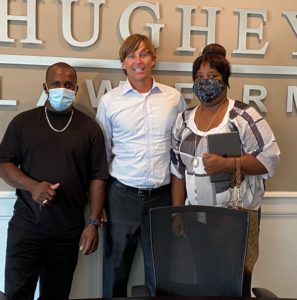
Commercial truck accidents–such as those involving semi-trucks, tractor-trailers, or big-rigs—can result in serious and life-threatening injuries, leaving accident victims wondering how to make ends meet. If you suffered injuries or lost a close family member in a truck accident in South Carolina, the law allows you to recover damages through a truck accident injury claim or truck accident lawsuit. The South Carolina personal injury lawyers at the Hughey Law Firm are standing by to help you. An experienced truck accident attorney from our firm will review your truck accident claim at no cost and advise you on how we can help you recover damages. Read on to learn more about truck accidents, what causes them, and the compensation that you may receive.
About the Hughey Law Firm’s South Carolina Truck Accident Law Firm
More than 4,000 fatal accidents take place each year in the United States that involve a commercial motor vehicle, and around 344,000 truck crashes result in injuries. Around 63% of all fatal commercial truck crashes involve two vehicles, and more than half of these crashes occur on a rural roadway or interstate. The vast majority of truck crashes take place on a weekday (Monday through Friday), and they are more likely to happen during the nighttime hours. Fatalities in accidents involving commercial trucks are more likely for the occupants of passenger cars than the truck driver.
Trucking accidents like this take place all the time in South Carolina—and when they do, the Hughey Law Firm is here to help victims recover compensation when someone else’s negligence caused the accident. In fact, we’ve recovered about $190 million in judgments and settlements for our clients since Nathan Hughey founded the Hughey Law Firm in 2007.
The Hughey Law Firm is proud of our results in truck accident cases. We have recovered:
- $5.425 million when our client suffered catastrophic injuries after a truck collided with his pickup.
- $2.025 million when our client was injured after a truck collided with his motorcycle.
- $750,000 when our client was injured due to highway defect.
- $264,204 when a tire on the defendant’s truck separated and crossed the center line, colliding with our client’s vehicle.
These past results don’t guarantee future successes—the results will always depend on the facts in each individual case. Each case must be evaluated on its own merits. Still, we think they demonstrate how hard we work to build successful cases and fight for every penny that our clients deserve.
HOW THE HUGHEY LAW FIRM HELPS OUR SOUTH CAROLINA CLIENTS
Accidents involving commercial trucks often result in catastrophic injuries, including traumatic brain injuries, spinal cord injuries, broken bones, and internal damage. These injuries are not only expensive to treat, but can be life-altering, sometimes resulting in permanent disability and the need for a lifetime of medical and personal care to address complications from the injury and to assist the person with tasks that they can no longer do on their own.
That’s why you need to seek the guidance of an experienced truck accident lawyer at the Hughey Law Firm when pursuing compensation for your injury-related expenses.
A South Carolina truck accident attorney can provide you with services that include:
- Establishing a value to your case. Your case’s value is the amount of out-of-pocket expenses you have incurred related to your injury, as well as financial compensation for the negative impacts your injuries have on your life.
- Determining all liable parties and associated insurance resources. In truck accidents, liability is often a complicated thing. While the truck driver may be liable for causing the accident, the trucking company that they work for may also be liable because the driver was representing the company at the time the accident occurred. Trucking companies must ensure their drivers have clean driving records and are properly trained for the job. Along with the truck driver and the truck company, other drivers on the roadway might also be liable for damages. The same holds true for the entity or individual who performed maintenance on the truck or the manufacturer or distributor of a defective truck part that led to the crash.
- Discovering and collecting evidence that will help prove liability and damages in your case. Truck accident cases involve a lot of evidence that must be obtained quickly from the trucking company to ensure that it is not lost or destroyed. Your truck accident attorney will know what evidence needs to be gathered and how to obtain that evidence.
- Engaging in skilled negotiation with representatives of the trucker’s insurance company. Insurance companies are out to make a profit and do not always engage in fair negotiations. An attorney has experience dealing with insurance companies, and can work to obtain a fair settlement on your behalf.
- Providing thoughtful guidance about the pros and cons of any settlement offer. Once the insurance company makes a settlement offer, your attorney can assist you in making an informed decision about whether or not to accept the offer.
- Representing you at all pre-trial hearings and conferences.
- Assisting you in collecting your settlement or award.
- Continuing to represent you if the defendant files an appeal.
We will work to identify all liable parties to the truck accident and your injuries and hold them accountable. We will also fight hard for you throughout the process to protect your rights and increase your chances of getting the maximum compensation possible.
What Types of Compensation Can I Receive for My Truck Accident Injuries?
The compensation you can seek through a truck accident injury claim or lawsuit includes damages such as:
- Medical expenses, including emergency medical treatment at the scene or at the emergency department, transport to the hospital by ambulance or air, hospitalization, diagnostic testing, physician’s services, surgical services, prescription medication, physical therapy, and rehabilitation. You can also claim your expenses for a prosthesis or mobility device such as a walker or wheelchair, and related home modifications.
- Lost wages resulting from being too injured to work or missing work to attend medical appointments.
- Loss of future earning capacity if your injury results in a permanent disability that renders you unable to work or to continue working in the same capacity as you did before the accident.
- Property damage, including the replacement or repair of your vehicle.
- Physical pain and suffering.
- Emotional or mental distress.
- Lost enjoyment of life.
- Lost companionship or support.
- Punitive damages, in cases where the defendant’s behavior that caused the accident was particularly reckless.
A truck accident lawyer from the Hughey Law Firm will carefully evaluate your claim and identify the types of compensation you can pursue. We will also calculate the amount of damages you suffered and seek fair compensation from those responsible.
WHY ARE SOUTH CAROLINA TRUCK ACCIDENTS SO DANGEROUS?
Commercial trucks are extremely large vehicles, often weighing 20 to 30 times more than the average passenger car. A truck’s size creates difficulty with maneuvering and increases the danger to the occupants of other vehicles, as well as pedestrians and bicyclists, in the case of an accident.
Some of the features that make trucks so dangerous include:
- Blind spots: A blind spot is an area around the vehicle that the driver cannot see by using their rear or side view mirrors. Commercial trucks have significant blind spots on all four sides, particularly along the passenger side. Blind spots pose a danger to others as the driver can’t see smaller vehicles, pedestrians, or bicyclists and may forget that someone is alongside them when changing lanes or making a turn.
- More distance required for stopping: Stopping a vehicle is not an instantaneous thing. It takes time and distance for the braking system to slow and stop the vehicle’s forward motion. The heavier the vehicle, the more distance it needs to stop safely. This distance can be increased by wet or slick roadways. A truck is a particularly large vehicle that needs long distances to stop safely, which poses a hazard to others on the road if a truck driver chooses to tailgate. Problems can also arise when vehicles misjudge the truck’s speed and pull out in front of it.
- Wide turns: A truck’s size also impacts the truck driver’s ability to turn the vehicle. Most commercial trucks bear signage that warns other drivers that the vehicle makes wide turns. However, an unaware motorist may find themselves trapped between the truck and the curb, or stuck in the way at an intersection as the truck swings widely to complete its turn.
- Higher ground clearance: Commercial trucks have higher ground clearance, which can result in an often deadly situation known as an underride, in which a smaller vehicle slides under the rear of the truck during a rear-end accident.
- Higher center of gravity: Commercial trucks also have a higher center of gravity that makes them prone to rolling over while going around a corner, a sharp curve in the roadway, or when performing collision avoidance maneuvers. Smaller vehicles can be crushed beneath the tractor-trailer as it rolls or are at risk of colliding with a rolled truck when coming around a blind corner.
Because of the size and weight of semi-trucks and other large commercial vehicles, crashes involving large trucks can cause utter devastation and severe injuries to the occupants of small passenger vehicles.
WHAT CAUSES TRUCK ACCIDENTS?
As with all motor vehicle accidents, human error is the leading cause of truck accidents. While the trucking industry is heavily regulated by federal and state governments, there is still room for truck driver error.
Some common truck driver errors include:
- Fatigued driving: In spite of hours of service regulations that dictate how many hours a truck driver can be on duty before taking a break, studies conducted by the Federal Motor Carrier Safety Administration estimate that driver fatigue is a factor in about 13% of all accidents involving commercial motor vehicles. Some of the reasons for this include the fact that many drivers drive during the nighttime hours, which is when the body is biologically programmed to sleep, as well as the fact that many truck drivers suffer from sleep apnea, a breathing condition in which a person’s breathing temporarily pauses during sleep, often dozens to hundreds of times during a single six- to eight-hour period of sleep.
- Impairment: Truck drivers are subject to regular drug and alcohol screenings as a condition of their employment. Unfortunately, many drivers still choose to indulge in alcohol and illegal substances while on the job, and drunk driving causes many serious truck accidents each year. Additionally, drivers may become impaired due to prescription or over-the-counter medications.
- Distracted driving: Truck drivers journey hundreds of miles and spend many hours on the road each day while being subject to the same distractions as other drivers. Some common driver distractions include texting and other cell phone use, adjusting vehicle or GPS controls, eating or drinking, billboards, and work zone activity.
- Speeding: As previously stated, the massive size of a tractor-trailer means that it needs more distance than the average passenger vehicle to come to a safe stop. Likewise, the truck is prone to rolling over when going around corners or curves at high speed.
- Reckless driving: Trucks cannot maneuver as well as smaller vehicles, and they take up a lot more room on the road. As such, if a truck driver drives aggressively or recklessly, weaving in and out of traffic, for instance, the trailer could swing out and strike other vehicles, or the truck driver could lose control due to a load shift or some other reason.
- Blind spots: Truck drivers are trained to address blind spots either through the use of mirrors, cameras, or other technology, or simply by being aware of what the traffic is doing around them. If a driver forgets that there is a vehicle in their blind spot, however, the risk of an accident is increased when that driver attempts to change lanes or turn. While other drivers must know that these blind spots exist and avoid driving in them, the truck driver needs to know when vehicles are moving into or out of their blind spots and ensure that it is safe to pass or turn.
- Unfamiliarity with the roadway: Truck drivers are often required to transport products to areas with which they are not familiar. Driving in an unfamiliar area can be confusing, and can result in a driver taking a massive vehicle the wrong way down a one-way road or on roadways where truck access is prohibited.
- Improper maintenance: The Federal Motor Carrier Safety Administration requires that semi-trucks be placed on a regular maintenance schedule. Due to the number of miles the average commercial truck travels daily and the weight that these trucks carry, maintenance of parts such as tires, brakes, and the steering system must be performed more frequently than for other vehicles. Truck drivers are also required to perform a visual inspection of their vehicles before each trip. Failure to regularly maintain or inspect the vehicle for hazards can result in blown tires, failed braking systems, and other issues that can lead to an accident.
- Defective auto parts: The makers and distributors of auto parts are required to produce parts that are safe for consumers when used properly. A truck manufacturer must also ensure they vehicles they design and build are safe, road-worthy, and capable of performing their intended tasks. If parts have been improperly designed, they can fail and cause an accident. In such cases, the manufacturer or distributor can be found liable for the resulting damages.
- Inclement weather: Although the weather itself is not a human error, truck drivers are trained on proper vehicle handling techniques that can help them avoid accidents caused by slippery roadways or a lack of visibility. Unfortunately, this training does not always prevent truck drivers from causing accidents in these conditions.
Other factors can cause truck accidents as well, and you should contact an attorney for a free case evaluation to determine if you qualify to receive compensation for your truck accident injuries.
SOUTH CAROLINA TRUCK ACCIDENT FAQ
Semi-truck accidents are often among the most catastrophic accidents on the road, resulting in serious injuries that can change a person’s life forever. In South Carolina, about 4,000 accidents involve commercial tractor-trailers each year, resulting in dozens of deaths and more than 1,000 injuries. If you’ve been injured in a truck accident, you likely have questions. Here are answers to some of the most common questions we get about South Carolina truck accidents—what causes them, who is liable, and how to recover damages.
How Long Do I Have to File a Truck Accident Lawsuit in South Carolina?
In most cases, you must file your South Carolina truck accident lawsuit within three years of the date of the accident that caused your injuries. Some exceptions can extend the time you have to file, but you need to contact an experienced truck accident attorney as soon as possible for specific advice about your case.
WHAT IS THE DIFFERENCE BETWEEN A SEMI-TRUCK, A TRACTOR-TRAILER, AN 18-WHEELER, AND A COMMERCIAL TRUCK?
Generally, all of these terms refer to large commercial vehicles. However, there are some distinctions between a few of the commonly-used terms:
- A semi-truck is just the tractor or truck part of the unit, where the driver sits and the engine is housed.
- A semi-trailer is the trailer that is attached to the semi-truck.
- A tractor-trailer is the combination of the semi-truck and trailer.
- An 18-wheeler also refers to the combination of the tractor and trailer.
- A commercial truck can be a tractor-trailer, but the category also includes other types of trucks used for commercial purposes, including single-unit box trucks or even dump trucks.
ISN’T THE SOUTH CAROLINA TRUCKING INDUSTRY HEAVILY REGULATED?
Yes, the trucking industry is regulated by the Federal Motor Carrier Safety Administration and is also subject to state laws and inspections.
Some of the regulations that drivers and commercial trucking companies must follow are:
- Hours of service requirements, which mandate how often a driver must take an off-duty break.
- Regularly scheduled maintenance on the truck.
- Physical examinations of the driver to determine if they are medically fit for the job.
- Regular drug and alcohol screenings.
- State and federal restrictions regarding the maximum allowable weight of vehicles on U.S. roadways.
- CDL licensing for all drivers.
WHAT EVIDENCE WILL MY ATTORNEY WANT TO OBTAIN IN MY CASE?
In addition to photos of the damaged vehicle and repair bills, medical bills, receipts for other out-of-pocket expenses, and details of the medical treatments you have received and your prognosis, other evidence your attorney will collect for a truck accident case includes:
- Information from the truck’s data recorder and in-cab camera.
- Logbooks and inspection records that can show the driver’s hours of service and the scheduled maintenance that was performed on the vehicle.
- Copies of the driver’s previous driving history to look for patterns of careless or reckless behavior.
- Proof of the driver’s prior training.
- The testimony of industry experts or eyewitnesses.
ARE SOUTH CAROLINA TRUCK DRIVERS HELD TO A HIGHER STANDARD THAN OTHER DRIVERS?
Yes. Commercial truck drivers are required to obtain additional training to learn how to safely operate their vehicles. If they are hauling hazardous chemicals, they are also required to undergo additional training and certification. In many states, drivers can be cited for alcohol impairment with a lower blood alcohol content than other drivers. In South Carolina, the legal impairment limit for those operating a commercial truck with a CDL is 0.04%. Commercial vehicle and semi-truck drivers found to be above that limit risk being arrested and having their CDL suspended.
WHY WOULD AN INSURANCE COMPANY SETTLE A SOUTH CAROLINA TRUCK ACCIDENT CLAIM?
Insurance companies are in business to make money, not pay out claims to individuals who were injured in accidents caused by their insured. They will do a lot to avoid these payouts. However, litigation is also expensive, particularly when the outcome of the trial is uncertain. Insurance companies will often offer a settlement in cases that are otherwise bound for court, and where they think they are likely to lose the case and have to pay the claim anyway.
IS MY SETTLEMENT FROM MY SOUTH CAROLINA TRUCK ACCIDENT CASE TAXABLE?
According to the Internal Revenue Service, economic and non-economic damages recovered through a settlement or award are not considered income and are not subject to tax. However, if there were punitive damages awarded in your case, those may be subject to tax. Additionally, if you take your settlement and invest it in stocks, the gains your stocks experience can be taxed. Check with an accountant before you spend or invest your settlement or judgment to make sure you withhold enough to pay any taxes you owe—but don’t allow any concerns about income tax to dissuade you from seeking compensation.
Do I need an attorney to pursue compensation in my South Carolina truck accident case?

Yes, you absolutely do. Because of the catastrophic nature of a commercial truck accident, you are likely dealing with injuries that are life-altering, long-lasting, and may even result in permanent disability. Your attorney will properly value your case and fight for you to get fair compensation to cover the expenses you face not only now, but also in the future.
Additional important services your truck accident attorney can provide include:
- Determining all sources of liability and insurance resources that may be available to compensate you.
- Collecting evidence and testimony that can prove liability and build your case.
- Negotiating with the at-fault party’s insurance company to obtain a fair settlement on your behalf.
- Filing required court paperwork in the proper jurisdiction and within the legally-required timeframes.
- Attending all pre-trial conferences and hearings.
- Providing guidance that can help you to make an informed decision about whether to accept a settlement offer.
- Representing you in litigation, including making opening and closing statements, presenting your case, and questioning witnesses.
- Providing assistance in collecting your settlement or award.
- Continuing to represent you if the defendant in your case files an appeal.

The experienced truck accident attorneys at the Hughey Law Firm can help you understand the legal process of obtaining compensation and explore your options with you for filing a truck accident claim or lawsuit. For a free case evaluation, contact us online.
CONTACT A SOUTH CAROLINA TRUCK ACCIDENT LAWYER TODAY
As a truck accident victim, you shouldn’t have to bear the costs of your injuries and losses resulting from a trucking accident. Let our experienced truck accident attorneys at the Hughey Law Firm help you to make sense of the legal options available to you and assist you in getting the compensation you deserve. Contact us online or by calling (843) 881-8644 to schedule your free case evaluation.

